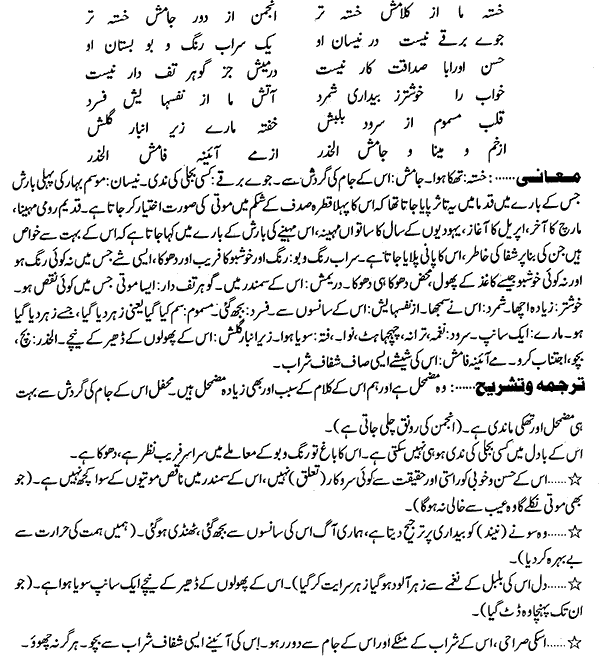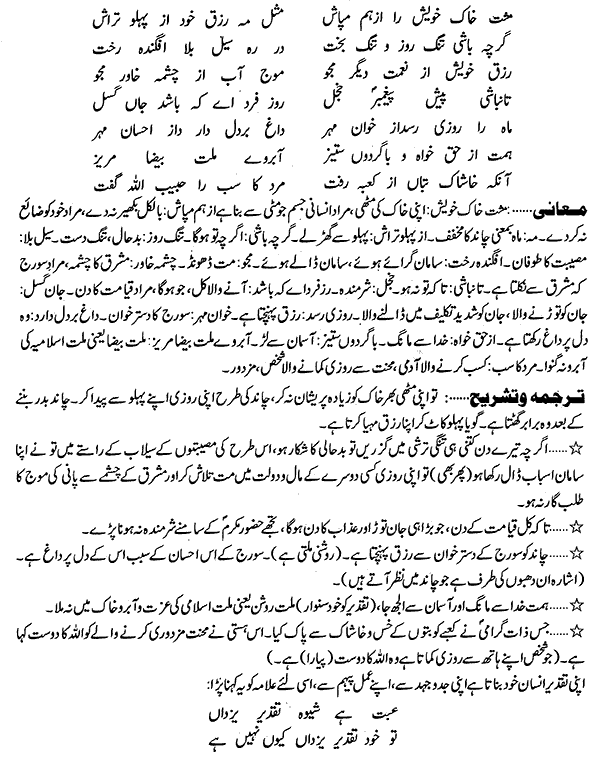A tale of which the moral is that negation of the self is a doctrine invented by the subject races of mankind in order that by this means they may sap and weaken the character of their rulersHast thou heard that in the time of old
The sheep dwelling in a certain pasture
So increased and multiplied
That they feared no enemy?
At last, from the malice of Fate,
Their breasts were smitten by a shaft of calamity.
The tigers sprang forth from the jungle
And rushed upon the sheepfold.
Conquest and dominion are signs of strength,
Victory is the manifestation of strength.
Those fierce tigers beat the drum of sovereignty,
They deprived the sheep of freedom.
For as much as tigers must have their prey,
That meadow was crimsoned with the blood of the sheep.
One of the sheep which was clever and acute,
Old in years, cunning as a weather‐beaten wolf,
Being grieved at the fate of his fellows
And sorely vexed by the violence of the tigers,
Made complaint of the course of Destiny
And sought by craft to restore the fortunes of his race.
The weak, in order to preserve themselves,
Seek device from skilled intelligence.
In slavery, for the sake of repelling harm,
The power of scheming becomes quickened.
And when the madness of revenge gains hold,
The mind of the slave meditates rebellion.
“Ours is a hard knot,ʹʹ said this sheep to himself,
“The ocean of our griefs hath no shore,
By force we sheep cannot escape from the tiger:
Our legs are silver, his paws are steel.
ʹTis not possible, however much one exhorts and counsels.
To create in a sheep the disposition of a wolf.
But to make the furious tiger a sheep – that is possible:
To make him unmindful of his nature – that is possible.”
He became as a prophet inspired,
And began to preach to the blood‐thirsty tigers.
He cried out, “O ye insolent liars,
Who wot not of a day of ill luck that shall continue for ever!
I am possessed of spiritual power,
I am an apostle sent by God for the tigers.
I come as a light for the eye that is dark,
I come to establish laws and give commandments.
Repent of your blameworthy deeds!
O plotters of evil, bethink yourselves of good
Lifeʹs solidity depends on self‐denial.
The spirit of the righteous is fed by fodder:
The vegetarian is pleasing unto God.
The sharpness of your teeth brings disgrace upon you
And makes the eye of your perception blind.
Paradise is for the weak alone,
Strength is but a means to perdition.
It is wicked to seek greatness and glory,
Penury is sweeter than princedom.
Lightning does not threaten the cornseed:
If the seed become a stack, it is unwise.
If you are sensible, you will be a mote of sand, not a Sahara,
So that you may enjoy the sunbeams.
O thou that delightest in the slaughter of sheep,
Slay thy self, and thou wilt have honour!
Life is rendered unstable
By violence, oppression, revenge, and exercise of power.
Though trodden underfoot, the grass grows up time after time
And washes the sleep of death from its eye again and again.
Forget thy self, if thou art wise!
If thou dost not forget thy self, thou art mad.
Close thine eyes, close thine ears, close thy lips,
That thy thought may reach the lofty sky!
This pasturage of the world is naught, naught:
O fool, do not torment thy phantom!
The tiger‐tribe was exhausted by hard struggles,
They had set their hearts on enjoyment of luxury.
This soporific advice pleased them,
In their stupidity they swallowed the charm of the sheep.
He that used to make sheep his prey
Now embraced a sheepʹs religion.
The tigers took kindly to a diet of fodder:
At length their tigerish nature was broken.
The fodder blunted their teeth
And put out the awful flashings of their eyes.
By degrees courage ebbed from their breasts,
The sheen departed from mirror.
That frenzy of uttermost exertion remained not,
That craving after action dwelt in their hearts no more.
They lost the power of ruling and the
resolution to be independent,
They lost reputation, prestige, and fortune.
Their paws that were as iron became strengthless;
Their souls died and their bodies became tombs.
Bodily strength diminished while spiritual fear increased;
Spiritual fear robbed them of courage.
Lack of courage produced a hundred diseases—
Poverty, pusillanimity, low mindedness.
The wakeful tiger was lulled to slumber by the sheepʹs charm
He called his decline Moral Culture.





































